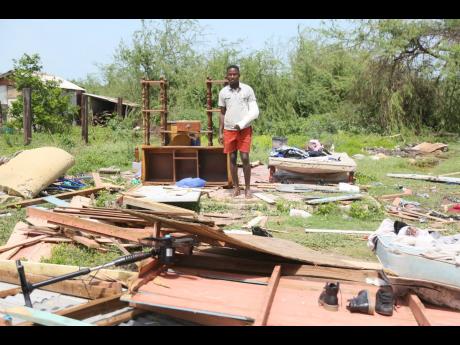READY TO REBUILD
Local builders confident of skilled workers supply for Beryl recovery, labour redistribution pitched
Players in the island’s construction industry are not expecting the local skilled labour shortage to impact rebuilding efforts as the country recovers from the impact of Hurricane Beryl.
While acknowledging that there has been limited assessment of the damage caused by the hurricane, president of the Incorporated Masterbuilders Association of Jamaica, Richard Mullings, is optimistic that the destruction is within the capacity of the local industry to repair.
“From our checks, we’ve not heard of any issue with material supply … . We’ve had discussions with major suppliers. They say they do have adequate stock for what they expect to be the major issues for rebuilding – roofing repairs and so on,” he said.
Mullings also contends that the country’s skilled labour shortage, which Prime Minister Andrew Holness described as a “national emergency” last year, should not affect rebuilding in the short term. Rather, he said that this issue is of concern in the context of long-term upgrades of Jamaica’s infrastructure.
He told The Gleaner that natural disasters should serve as a reminder to the Government about the importance of the local industry. He argued that the Government should refrain from “rushing to replace or ignore local industry in favour of foreign firms and then being unable to respond when we have a natural disaster”.
Mullings stated that proper organisation is key to addressing issues that may arise in the redistribution of labour from existing projects to focus on the high demand for skilled labour for recovery efforts.
“What you find is that companies and skilled labourers may be redistributed from existing projects to deal with sudden short-term demand, so the capacity is there. We think it’s more just a matter of timing and organisation,” he said.
The option to redistribute labour from major projects is “worthwhile and worth thinking through”, said Dayton Wood, president of the Jamaica Developers Association. However, he stressed that there could be significant drawbacks to this approach.
“Suspending major projects comes with a major cost as well because those projects have financing and you are going to increase the cost to get them completed, and then you delay the completion and then … there is a snowball effect to that,” he told The Gleaner.
“I could imagine that there are instances where that could work … for projects that are not time-sensitive, so to speak, but clearly for others, that wouldn’t work,” he added.
Further delay, he said, could arise from a shortage in the materials needed for the repairs.
“I don’t think the merchants would have had additional stock, the volume of stuff that they’re going to need now. There could be some delay in getting those in. Clearly, there’s probably some price implications as well,” said Wood.
But noting that climate change has made severe weather events more frequent and dangerous, Mullings said a scientific assessment of how construction is done in Jamaica is needed to lessen future damage to infrastructure.
However, he acknowledged that adjustments to current building construction processes would incur additional costs.
“So we can make the roof stormproof, but will the average Jamaican be able to afford a roof? These things also come with some balancing act,” he said.
In the meantime, Dr Taneisha Ingleton, managing director of HEART/NSTA Trust, said the country’s technical and vocational skills training institute is ready to assist with rehabilitation efforts.
“This is a part of our plan and we will definitely be supporting [recovery efforts] across the island,” she said. “We do a lot of community development projects. We hand over tiny houses and we have several community-rebuilding projects that we did for this year.”


